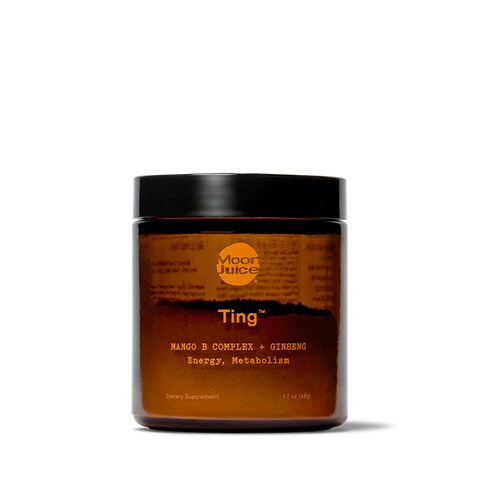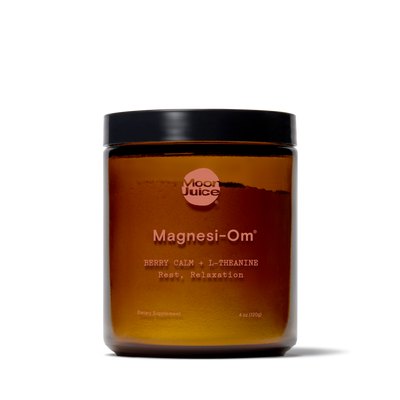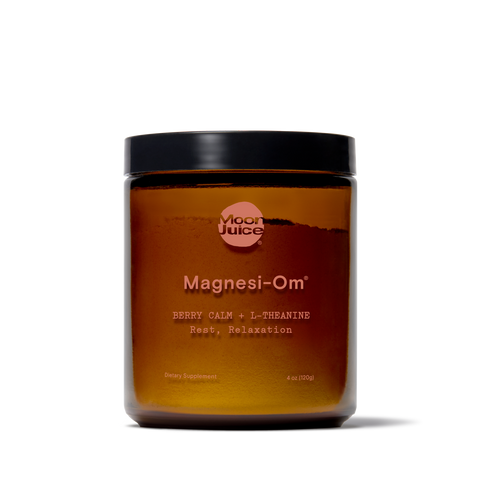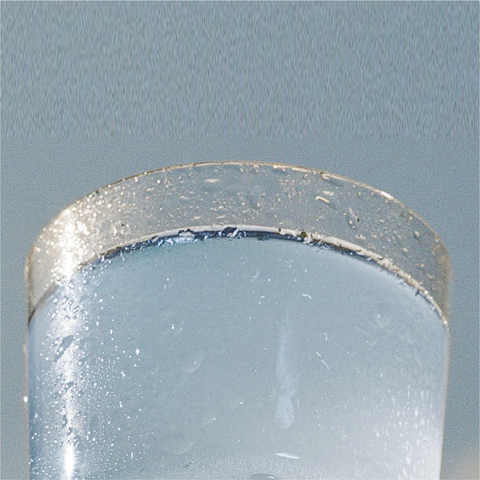In order to function optimally, our hormones require things a certain way. When they’re out of balance, it can impede a number of functions in our bodies, from flare-ups to more serious conditions. Luckily there are many things we can do on a daily basis to keep our endocrine systems flourishing, from gentle movement to supplementing with hormone-supportive ingredients like adaptogenic Shatavari and B Vitamins.
But first, let’s define what hormones actually are. They’re chemical messengers that aid our bodies in nearly every arena: fertility, libido, sleep, mood, hunger, and growth. In order for our bodies to stay in equilibrium, we need hormones in very specific amounts.
To understand how hormones function, you first have to understand the endocrine system. It’s the body’s hormonal control system made up of organs called glands. This includes the pituitary gland, adrenal gland, hypothalamus, ovaries, testes, thyroid, and pancreas. These glands secrete and release targeted hormones that tell different parts of our bodies what to do and when.
Take, for example, the pituitary gland. It’s situated at the base of the brain, and monitors when our hormone levels rise too high. It signals to other glands when to pause hormone production so the body can return to its healthy, balanced state—known as homeostasis. This system relies on a delicate balance to ensure everything runs smoothly.
What are the causes of hormonal imbalance?
There are several factors that can impact the balance of our hormones. First are the natural hormonal changes that happen in different stages of life, from puberty in our teenage years to pregnancy, postpartum, perimenopause, and menopause. Then there’s stress. When the body’s in a state of chronic stress, hyperactivity of the HPA Axis (the hypothalamic pituitary adrenal axis, responsible for the body’s stress response) can cause normal hormone function to become disrupted.
We also encounter chemicals from plastics, pesticides, and even household products that can throw off our hormones. These are called endocrine disruptors, and they can have a dramatic effect on our bodies over time. We know that the production of sperm, for instance, is dependent upon certain hormones such as testosterone and follicle stimulating hormone (FSH). Illuminating research from 2020 indicates that those with occupational exposure to BPA plastics, a qualified endocrine disruptor, had decreased sperm count and viability than those who weren’t exposed to BPA at the workplace.
What are the signs of hormonal imbalance?
Hormonal imbalance can manifest in a variety of ways, like low libido, breakouts, dry skin, hair loss, weight gain, constipation, and poor sleep. More serious endocrine-related conditions can be depression, diabetes, infertility, and PCOS. The list goes on.
How can you bring your hormones back into balance?
The endocrine system needs specific nutrients in order to support healthy hormonal function. A colorful diet full of adequate protein, healthy fats, fruits, and vegetables can help keep your levels on track. Supplements are another very supportive way to address hormonal concerns.
9 Supplements to Balance Hormones
Shatavari
Shatavari is an adaptogen that’s traditionally used to help support healthy hormonal balance. Adaptogens are superherbs and supermushrooms that help the body both heal from and ward off the damaging effects of stress.
A member of the asparagus family grown throughout Nepal, India, and Sri Lanka, Shatavari is a root adaptogen that has traditionally been used in Ayurveda to support healthy hormonal balance throughout each phase of life, relieving PMS symptoms, regulating menstruation, optimizing fertility, and alleviating menopausal symptoms.
A 2018 study suggests that Shatavari could be useful in overcoming the effect of stress on our hormones and reproductive systems by increasing antioxidants and reducing oxidative stress in the body.
Magnesium
This mineral helps calm the HPA Axis and balance stress hormones. It also helps the liver metabolize hormones like estrogen, progesterone, and testosterone. If you have thyroid hormone imbalances, Magnesium can help correct this by assisting in the conversion of inactive T4 thyroid hormones to active T3 forms.
Most people don’t get adequate levels of Magnesium through their diet alone—in fact, over 50% of the U.S. is deficient in the mineral. Plus, when the body’s in a state of stress, it pushes Magnesium out of the cells for protection and regulation. When levels aren’t repleted, it can throw off your hormones. Supplementing with a calming Magnesium powder daily is a great way to ensure your daily intake.

Schisandra
Also an adaptogen, Schisandra is a red berry native to China. Prized in Traditional Chinese Medicine as a longevity and beauty berry, it’s traditionally used to support the endocrine system, strengthen the immune system, and gently energize the nervous system. A 2016 study found that the adaptogenic Schisandra and Rhodiola exerted an anti-stress effect in rats by balancing the HPA Axis.
Ashwagandha
This is another common adaptogen that helps support balance of the HPA Axis. It’s a potent flowering shrub that is relied upon heavily in Ayurveda to help reduce stress and regulate cortisol levels. Ashwagdandha's benefits are used far beyond Ayurvedic Medicine— you'll often find this adaptogen in many natural mood support supplements today. Studies from both 2012 and 2019 showed that adults who took Ashwagandha Root Extract experienced improved stress, cortisol levels, and sleep compared to the placebo. Researchers are currently studying how Ashwagandha supplements might help support insulin and reproductive hormones.
B Vitamins
B Vitamins like B2 (Riboflavin), B3 (Niacin), B7 (Biotin), B9 (Folate), and B12 (Cobalamin) are well known to support hormonal balance, especially when it comes to reproduction. For example, they’re really important for those pregnant or breastfeeding! Vitamin B5 (Pantothenic Acid) helps create hormones necessary for pregnancy, while Vitamin B6 (Pyridoxine) is crucial for producing norepinephrine and serotonin.
B Vitamins can be found in a variety of foods like darky leafy greens, asparagus, beans, almonds, walnuts, sunflower seeds, and whole grains.
Shilajit
An ancient, tar-like substance found on rocks in the Himalayas, Shilajit is an adaptogen that contains over 85 minerals and trace elements that the body needs to function at its peak. It is traditionally used to support libido and hormonal balance, and has been shown to increase testosterone, a hormone critical for cultivating sexual charge in both men and women.
In one clinical study, male participants aged 45 to 55 received a 250 milligram dose of Shilajit twice daily. After 90 consecutive days, they had a significantly higher testosterone level compared to the placebo group. Signs of low testosterone include hair loss, a lower sex drive, increased body fat, and fatigue.
Shilajit may also have benefits for male fertility. In a study of 60 infertile men, over 60% showed an increase in total sperm count and more than 12% had an increase in sperm motility after taking Shilajit twice daily in a 90 day period.
Vitamin D
Hormonal imbalance may be an indicator that your Vitamin D levels are low. Technically, Vitamin D isn’t actually a vitamin—it’s what we call a hormone precursor. Our bodies use Vitamin D to produce calcitriol, a powerful hormone that messages key endocrine and hormone-balancing genes to either express or suppress themselves.
Marjoram
A sub-species of Oregano, marjoram is an herb from the mint family with a subtle, floral, lightly spiced taste. A small study found that drinking Marjoram tea twice daily for 1 month had a beneficial effect on the hormonal profile of women with PCOS, improving their insulin sensitivity and adrenal androgen levels compared to the placebo group.
Cacao
Rich in minerals and antioxidants, Cacao helps stimulate endorphin release and can help increase serotonin and dopamine levels in the brain. Cacao also helps support energy and spark libido.
You can find our raw, organic heirloom Cacao—along with adaptogenic Shatavari, Schisandra, and Shilajit—in our Sex Dust® blend. It’s a stimulating mix of adaptogens and herbs that target stress to support healthy hormonal balance, libido, and creative energy.
Using Sex Dust® to Balance Hormones
Ongoing stress can cause the adrenals to produce excess cortisol, disrupting sex hormones and in turn, libido. If you’re struggling with stress or a low sex drive, try making Sex Dust® part of your daily routine. It’s a stimulating adaptogenic blend informed by Traditional Chinese Medicine and Ayurveda that targets stress to support healthy hormonal balance and libido. This natural libido supplement combines Shatavari, Shilajit, Epimedium, Schisandra, Cacao, and Maca. It has a smoky Cacao flavor that pairs well with coffee and smoothies—just add 1 tsp of this natural hormone supplement into your daily bev to feel the benefits.
In addition to supplementing, there are easy things you can do to support your hormones on a daily basis.
- Get Moving: Physical activity plays an important part in increasing hormone receptor sensitivity, meaning that it helps fine-tune hormone signals and the delivery of nutrients. Exercise also plays a vital role in helping improve the way your body reacts to the hormone insulin, which can help decrease the risk of conditions such as diabetes.
- Sleep Well: We know that poor sleep can increase cortisol and impair insulin sensitivity, so be sure to get your nightly 8 hours in.
- Manage Stress: Find little moments to unstress throughout the day to keep your cortisol levels in check. Stand in the morning sun, practice meditation or yoga, cook without distractions, or listen to a podcast that makes you laugh.
- Eat For Hormones: Enjoy a diet full of protein, fiber, and healthy fats. The body needs protein in order to produce peptide hormones, which help regulate physiological functions like growth, energy metabolism, and reproduction.
Your endocrine system controls so much of what happens in your body, from libido to mood to energy. While eating a balanced diet is certainly an essential factor of hormone health, supplements are an easy way to provide extra support. Adaptogenic blends with herbs like Shatavari, Schisandra, and Shilajit are a great place to start.
Sources
Endocrine System
Bisphenol A and Male Fertility: Myths and Realities
Impact of stress on female reproductive health disorders: Possible beneficial effects of shatavari (Asparagus racemosus)
Activities of Serum Magnesium and Thyroid Hormones in Pre-, Peri-, and Post-menopausal Women
Schisandra chinensis and Rhodiola rosea exert an anti-stress effect on the HPA axis and reduce hypothalamic c-Fos expression in rats subjected to repeated stress
Effects of Withania somnifera on Reproductive System: A Systematic Review of the Available Evidence
Role of Withania somnifera (Ashwagandha) in the management of male infertility
Clinical evaluation of purified Shilajit on testosterone levels in healthy volunteers
Clinical evaluation of spermatogenic activity of processed Shilajit in oligospermia
Schisandra chinensis
The effect of marjoram (Origanum majorana) tea on the hormonal profile of women with polycystic ovary syndrome: a randomised controlled pilot study
Health Benefits of Cacao Nibs
Defining meal requirements for protein to optimize metabolic roles of amino acids
Exercise and Insulin Resistance
HPA Axis and Sleep
The Role of Sleep Curtailment on Leptin Levels in Obesity and Diabetes Mellitus
Sleep deprivation and obesity in adults: a brief narrative review
Role of Peptide Hormones in the Adaptation to Altered Dietary Protein Intake

















